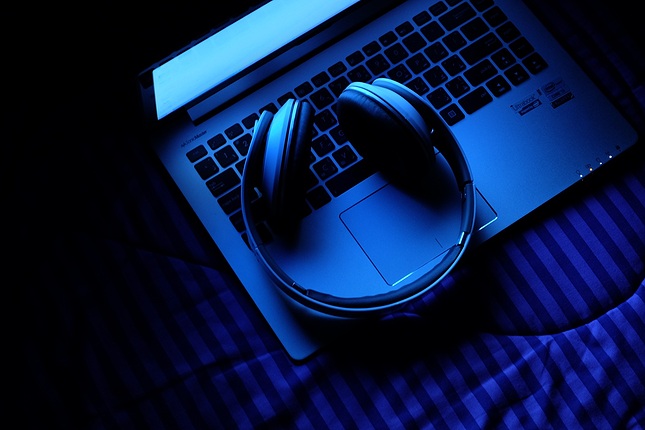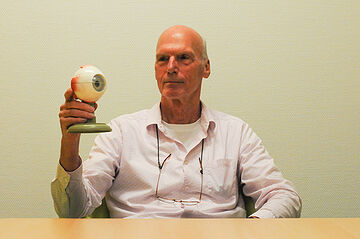There is no scientific evidence that the blue light from a screen is harmful to your eyes.
–

–
–
–
–
–
As a journalist and frequent laptop user, I sometimes worry about my eyes. I stare at a screen every day, several hours in a row. I don’t think that can be good. Fortunately, my optician had a solution for that: the so-called blue light filter glasses.
The lenses of such glasses have a yellow coating. This would reduce the amount of blue light hitting the retina. At first I was still in doubt, but when the optician shone a blue light through a normal and filter glasses, I was sold. What a difference! Nowadays, almost every optician offers these types of fencing glasses. But is wearing a blue light filter useful?
Lots of Energie
 –
–
“The amount of blue light that comes from a screen is insignificant compared to the sun,” says Tom van den Berg.
photo" />
Nathalie Winkster for NEMO Kennislink via CC BY-SA 3.0
–

photo" />
Nathalie Winkster for NEMO Kennislink via CC BY-SA 3.0
–
–
–
–
–
According to physicist Tom van den Berg, who works at the Netherlands Institute for Neuroscience and an eye specialist, not. “There is no scientific evidence that wearing blue light filter glasses is of any benefit,” he says. Together we take my brand new glasses for a white piece of paper. A light yellow glow can be seen. “This degree of yellowness is completely negligible.”
According to Van den Berg, the fear of blue light is an easy sales pitch. “The white light from the sun consists of a whole spectrum of colors, including blue light. When you take a walk outside, this type of light is constantly hitting your retina. Our eyes can withstand this well under normal circumstances,” says Van den Berg.
Only when you have to deal with extremely much blue light, for example if you look straight at the sun for a minute, can blue light cause considerable damage. “This creates a kind of burn mark on the retina.” Blue light has a short wavelength and therefore contains a lot of energy compared to yellow or red light. “If molecular structures in the eye absorb this light, the high level of energy can cause damage,” explains Van den Berg.
Sleeping problems due to blue light?
“Blue light has gotten a bad name over the years, but many people forget that we need blue light to function properly,” says ophthalmologist Marnix Claeys. Our biological clock reacts to it. Several light receptor cells are located on the retina. A small part of these, the ganglion cells, contain the protein melanopsin. This light-sensitive protein is not so much involved in seeing, but in regulating all kinds of light-sensitive processes in the body. When daylight falls, the body receives a signal to produce the hormone cortisol. This gives you energy. Meanwhile, melatonin production is inhibited.
It is known that screen use until the late hours can disrupt the sleep-wake rhythm. Despite the fact that melanopsin is extra sensitive to blue light, there is no scientific evidence that the blue light from screens in itself leads to sleeping problems. “Yet many laptops and smartphones today have a night mode. When this is on, less blue light is emitted. If you are unable to put your mobile down before going to sleep, you can certainly try this”, advises Claeys.
–
–
Featured by the editors
 –
–
Compensating for CO2 does not work as promised
–
–
 –
–
Biology
Home remedies for hay fever under the microscope
–
–
 –
–
Humanities
Robots keep you on track
–
–
–
–
–
Kicked in with open eyes
So it’s true that blue light can be bad for your eyes. Still, this is no reason to panic if, like me, you spend a lot of time in front of your laptop. “The amount of blue light emitted from a screen is nothing compared to the sun. There is therefore no research that shows that the light from screens is harmful to your eyes,” says Van den Berg.
According to the eye specialist, blue light filter glasses are nothing more than a clever marketing ploy, which I fell for with my eyes open. Van den Berg shows me the colored glasses he has collected over the years. “Every five years new colored glasses appear and every five years we as experts have to conclude that there is no evidence of positive effects.” Fortunately, colored glasses can do little harm. “They may cost a little, but they’re not bad for your eyes. And if you feel like they make you look calmer, why not wear them?”
Tired eyes from the screen
With intense screen use, we demand a lot from our eyes. “Many people look at a screen all day before work, then turn on the TV at home and even look at their mobile in the toilet. Our eyes are not made to run a marathon every day,” says ophthalmologist Marnix Claeys. No wonder some people develop irritated, dry or burning eyes over time. “That has nothing to do with blue light, but with a lack of blinking,” says Claeys.
Physicist eye specialist Tom van den Berg agrees: “Our eyes are made to walk through the forest. In doing so, looking near and far is continuously alternated.” That is why Claeys adheres to the 20-20-2 rule: alternate 20 minutes of looking close by with 20 seconds of looking in the distance and go outside for 2 hours a day. “Especially for children, this is important to inhibit the development of myopia,” says Claeys.
–
–
–
.jpg?1641292402)

